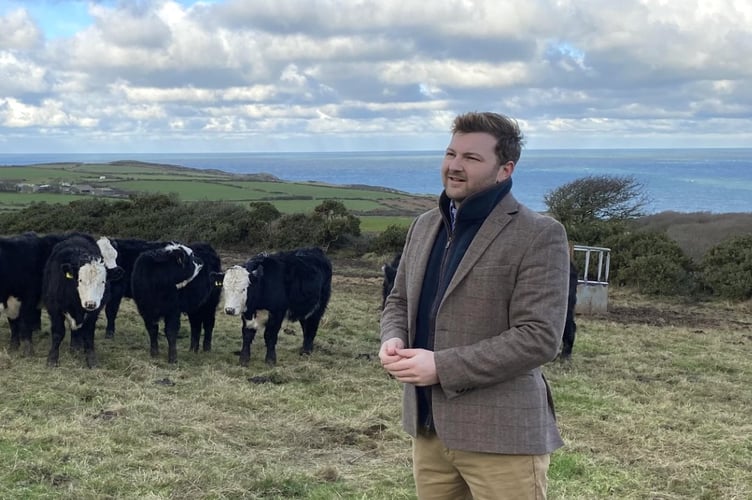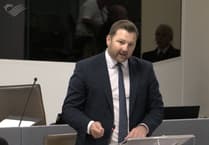The Scheme is designed to secure the future of food production while also protecting the environment for generations to come. It recognises farming's vital role in Welsh communities and culture and addresses challenges like climate change and restoring nature.
Deputy First Minister with responsibility for Climate Change and Rural Affairs, Huw Irranca-Davies said:
"This Scheme is the product of extensive collaboration. We've listened carefully to farmers across Wales and revised our approach to ensure it works for the agricultural industry and meets our shared responsibilities to the natural world around us.
“I would like to thank those who responded to consultations and attended meetings the length and breadth of Wales, and I’m grateful to all members of the Ministerial Roundtable and supporting Working Groups for their input.
“We’ve listened, and we’ll continue to listen. It’s clear that the people of Wales want us to back Welsh farming, but they also want to see nature restored, soils protected, water quality in our rivers improved, access to the countryside maintained and nature supported to recover and thrive.
“With this in mind, the Scheme represents a new relationship between the people of Wales and our farmers. This is not just a Scheme for farmers, this is a Scheme for the whole of Wales – A whole farm, whole nation approach.
"We recognise this involves change. This Scheme is fundamentally different from the Basic Payment Scheme, but absolutely necessary for the long term success of farming, food production and the environment.”
The Scheme will work as follows:
The Sustainable Farming Scheme will begin on 1 January 2026 with the application form for the Universal layer of the scheme being available on the Single Application Form (SAF) via Rural Payments Wales (RPW) Online from March through to 15 May each year.
- An annual Universal Payment will go to farmers joining the Scheme who follow the Scheme Requirements including a set of Universal Actions . Many of these actions will be familiar to farmers in Wales, whether beef, dairy, arable, upland, lowland, extensive or intensive.
- The Scheme has been made less complex with fewer administrative requirements. The number of Universal Actions has been cut and built on the tried and tested processes and systems of Rural Payments Wales (RPW).
- The combination of the Universal, Optional and Collaborative layers provides a long-term stable framework to support sustainable farming in Wales. It gives stability through the Universal layer, and additional support to those who want to do more through Optional and Collaborative Actions.
- All farmers entering the Scheme will need to complete an opportunity plan for woodland and hedgerow creation in the first year of entry into the Scheme. They will need to demonstrate progress towards their plan by the end of the 2028 scheme year.
- Generous support will be provided for tree and hedgerow planting in the Optional Layer, including for agroforestry, and there will be a higher payment rate for tree planting during the first 3 years of the Scheme.
- Farmers are not expected to plant trees on their most productive land – they will decide where to plant, with clear advice and guidance to ensure the right tree in the right place.
- Farmers in the Scheme will need to have at least 10% of their land actively managed as habitat, to benefit biodiversity and support nature recovery alongside food production. A range of temporary habitat options are available to choose from if farmers need to do more to meet the 10% requirement.
The Welsh Government has given substantial funding to provide stability for the farming sector over many years, and we will continue to do so. We have committed the equivalent of this year’s BPS budget to the Universal Payments in 2026 (£238m for 2026 Universal and BPS payments) to provide financial stability to farmers and an incentive to join the SFS.
A significant budget will be provided for Optional and Collaborative Actions, building on the Preparatory Phase Schemes available this year. This will provide further income for farmers and support them to improve their productivity, plant trees and hedges where they benefit the farm and improve or create new areas of habitat.
By the time of the Royal Welsh Show a simple ready reckoner will be available on the Welsh Government website. Farmers will be able to calculate an indicative payment for the SFS Universal Payment for their farm.

We have listened to opinions across the agricultural industry and the Scheme is now much simpler. There are fewer Universal Actions and we have made it less complex and more accessible to all types of farms.
It is a flexible Scheme to accommodate different farming systems and practices, ensuring it is truly accessible to tenant farmers. There are also no barriers to entry for new and young entrants who have access to land and can meet the requirements of the Scheme, supporting the next generation of Welsh farmers.
The Deputy First Minister, concluded: “This represents a landmark moment for Welsh agriculture, with farmers playing a central role in our food security, environmental protection, and maintaining the distinct cultural heritage and language of rural Wales.
“Our ambition is to see a thriving and confident agriculture industry in Wales, that is built around innovation and growth, to rise to the challenges we face and make most of the opportunities available.
Shadow Rural Affairs Secretary and Conservative Member of the Senedd for Carmarthen West and South Pembrokeshire, Samuel Kurtz said that he still believed that Labour’s relationship with farming and rural Wales is ‘broken’.
“After 7 long years, farmers can now see what future support may look like, but they remain in the dark as to the economic impact of the scheme,” he remarked.
“Labour’s relationship with farming and rural Wales is broken; from its failure to eradicate Bovine TB to the Family Farm Tax. This new scheme, released without an economic impact assessment, does little to rebuild that trust. Questions remain over funding, tree planting and why has the Cabinet Secretary did not release the economic impact assessment when he has had sight of it?”
Kurtz, a farmer’s son, added: “I stood shoulder to shoulder with protesting farmers on the steps of the Senedd last year, and I continue to stand by their side against any policy that jeopardises food security, threatens rural jobs and negatively impacts the livelihoods of rural families.”





Comments
This article has no comments yet. Be the first to leave a comment.